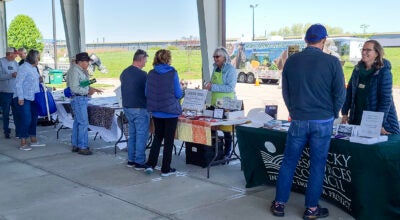Ky. House tackles road funding, maternal health, veto override
Published 4:00 pm Tuesday, March 12, 2024
By Representative Daniel Elliott
The legislative work continues, as bills are brought for votes on the House and Senate floors. Lawmakers voted on Wednesday to override the governor’s first veto of legislation this session.
While it was his first this year, the governor has vetoed more than 100 bills and resolutions since 2020. Most bills go to the governor’s desk after passing the House and Senate. A governor can sign a bill into law, allow it to become law without his or her signature, or veto it. However, to balance the veto power, lawmakers have the authority to override the veto with a vote. The legislature has overridden vetoes by every single governor in state history. And, lawmakers have overridden almost all of Governor Beshear’s vetoes.
The vetoed bill that lawmakers overrode would prohibit local governments from adopting or enforcing ordinances that require landlords and property owners to accept federal housing assistance funds like Section 8. While I generally support local control and local decision making, I believe that property owners have a fundamental right to make decisions about their property. HB 18 prohibits local governments from imposing source of income mandates on rental properties.
Such bans would prevent property owners from assessing whether prospective tenants have a reliable source of income to pay for rent under the terms of their lease, which would limit the owner’s ability to make discretionary decisions about their property.
In addition to overriding the Governor’s veto, we passed several other important measures through the House:
Planning for the 2026 Biennial Road Plan:
HJR 91 would set out a non-binding plan for road projects with work scheduled for 2027-2030. HJR 91 would lay out a starting point for the 2026 biennial road plan.
Local Road Priority Projects:
HJR 92 would provide a new framework for funding local road projects, setting aside $25 million in each fiscal year with $20 million defined by the legislature for city and county road projects and $5 million dedicated towards unforeseen road hazards. HJR 92 would ensure county and city roads get the attention and rehabilitation that they require and eliminate the politics from road projects.
Providing Funding for the Transportation Cabinet:
HB 265 would appropriate $6.98 billion for the Kentucky Transportation Cabinet (KYTC) biennial operating budget.
2024-2026 Highway Construction Plan:
HB 266 would invest more than $4.18 billion – including $14 million for guardrails, $800 million towards bridges, and the continuation of the Brent Spence Bridge, I-69, and Mountain Parkway projects. The plan is a culmination of three and a half months of work. We developed a responsible road plan that funds our state’s road projects over the next two years. HB 266 is a result of discussions held with officials from across the Commonwealth. Reliable roads are crucial to the quality of life of every Kentuckian.
Saving Lives and Preserving Families:
HB 10 tackles a wide variety of topics relating to maternal health, such as, it would provide mental health consultation and access to care through the Lifeline for Moms Psychiatry Access Program. The Lifeline for Moms program, which provides training, and real-time psychiatric consultation and care coordination for health care providers serving pregnant and postpartum women. The measure would expand the HANDS program to include lactation counseling and assistance, education on safe sleep, and research on the role of doulas in the birth experience.
HANDS is a voluntary home visitation program for new or expectant parents. Services can begin during pregnancy and extend until the child is three years old. Additionally, the measure would strengthen an existing advisory council to provide ongoing policy guidance to increase collaboration, improve data collection, and suggest additional improvements. HB 10 is about saving lives and preserving families. Entirely too many Kentucky mothers die in the year following childbirth, leaving their children and families behind to pick up the pieces.
Establishing Broadband Implementation:
HB 267 would provide for the authorization of the Office of Broadband Development to implement the federal Broadband Equity Access and Deployment (BEAD) Program. HB 267 would give guide rails for the funds appropriated in the 24RS biennial budget bill. Additionally, the measure would direct the Office of Broadband Development to develop an application for funding, determine eligibility criteria for projects, create rules governing the review process and the timeline, make administrative rules, coordinate with local governments or private entities, and determine which grant applications should receive funding. During the 2022 Regular Session, we made sure there were funds available to get this critical access to every Kentuckian. This session we are focusing on providing guide rails for the funds going straight to the residents who need it most.
Cutting Red Tape for After School Programming:
HB 491 would eliminate unnecessary red tape around after school programs. HB 491 would eliminate the single skill restriction to allow after school programs that are not child care facilities to operate without child care licensure. These facilities would still be required to notify the parents or guardians that they are not a licensed child care facility and programs would still be required to operate outside of the hours that school is in session.
Allowing Voters to Fill U.S. Senate Vacancies:
HB 622 would allow Kentuckians to vote in a special election if the state’s U.S. Senate vacancies. Under current law, if there is a vacancy, the governor has the power to appoint someone to fill the seat until the next regular election. The appointment must be made from a list of three candidates provided by the outgoing senator’s political party. HB 622 is based on the fundamental philosophy that a government by the people and for the people should ensure that the people have the authority to choose their elected officials. We already use this process to fill vacancies in the U.S. House, and the Kentucky General Assembly.
I am happy to report that I personally saw two pieces of legislation be passed by the House recently as well. HB 320 is a measure that awaits consideration in the Senate that aims to align Kentucky’s employment claim statute of limitations with the federal standard in order to be more competitive in attracting business to the commonwealth, as well as alleviating the administrative burden on small businesses already here.
Additionally, HB 476 has been moving through the legislative process with unanimous support in the House. This measure would allow a parent to voluntarily terminate his or her parental rights during the pendency of a proceeding relating to dependency, neglect, and abuse actions by signing a consent form. HB 476 has most recently passed the House and has been assigned to the Senate Judiciary committee.
As always, I can be reached anytime through the toll-free message line in Frankfort at 1-800-372-7181. You can also contact me via e-mail at Daniel.Elliott@lrc.ky.gov and keep track through the Kentucky legislature’s website at legislature.ky.gov.







